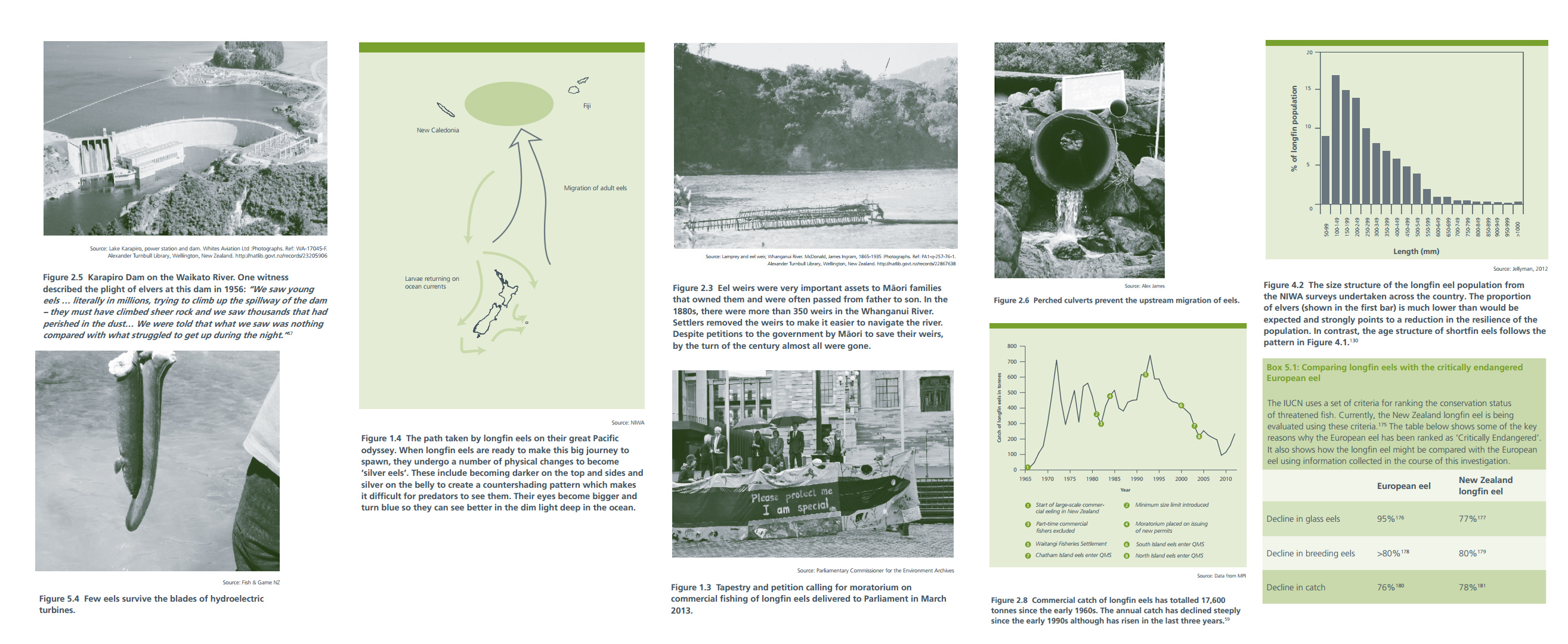PCE echoes calls for a moratorium on commercial long-fin eel harvesting
On Friday of last week the Parliamentary Commissioner for the Environment (PCE) released a report recommending an immediate cessation of the commercial harvest of the longfin eel, along with the urgent implementation of additional measures to halt the decline of this species.

Get the picture? Our longfin eel population will slowly go extinct if we don’t halt commercial harvesting of this special native species. Please note: these graphics have been sourced from the PCE’s latest report. Click to enlarge the picture.
The New Zealand longfin eel (Anguilla dieffenbachii) has been increasingly in the limelight in recent years due to concerns about its conservation status that have been raised by freshwater ecologists, fisheries interests and the general public.
Concerns have increased and spread, particularly regarding the fact that the longfin eel (an endemic, declining species) is still being commercially harvested, despite a growing body of evidence suggesting that the fishery is unsustainable. In March of this year, a large group of people (including many groups of schoolchildren) marched on parliament to deliver a petition signed by 7000 New Zealanders, demanding a moratorium on the commercial exploitation of this species. Last week, the PCE publically added its voice to this demand.
Commissioner Jan Wright, an independent Officer of Parliament, is responsible for providing impartial advice to MP’s regarding environmental issues. The Commission’s well-researched report concludes that there is sufficient scientific evidence to show that not only is the longfin eel population declining, but that a population crash is likely imminent.
The report discusses the failures of the Ministry for Primary Industries (MPI), in managing the freshwater eel fishery – particular criticism is reserved for the flawed science used by the Ministry and their seeming reluctance to consider additional scientific research that paints a ‘less favourable’ picture of the longfin eel’s population status:
“No indicator of the state of a fish species can be perfect, especially for a species that leads a life as complicated as the longfin eel. However, other information that provides a much richer and deeper understanding of the plight of the longfin eel is presented in Chapter 4. Most of this data has been available but not used by MPI.”
The report includes a detailed summary of the rise and fall of commercial eel fishing in New Zealand over the past fifty years (note that this is less than one longfin generation) and refers the reader to crashes of overseas eel populations, all of which have experienced the same exploitation trends – initial mass extraction of a ‘new’ commodity, followed by continued reductions in catches, until available fish levels are so low that they have now become a delicacy:
“At one time there were 23 processing factories [in New Zealand]; today there are four.”
An additional section of the report discusses the ineffectiveness of recent efforts at preserving eel populations, such as “trap-and-transfer” operations at hydrodams:
“It is important to understand that trapping and transferring elvers does lead to some eels living and growing in catchments above dams, but it does very little for the long-term sustainability of the population … Helping large eels down past a hydro dam and out to sea to breed is much more difficult than helping elvers up. Left to themselves, very few will survive the blades of the turbines.”
While the report details the additional threats that longfin eels face (barriers to migration, pollution, habitat loss, targeted extermination), it notes that there is one straightforward and immediate means by which we can attempt to slow longfin declines – the cessation of commercial exploitation:
“Although commercial fishing of longfin eels is far from the only reason from their decline, I have recommended that it be stopped, at least for a time. No other action has the immediate potential to reverse the decline of the species.”
In all, the report paints a compelling picture that the Ministry of Primary Industries will not be able to ignore, particularly as the conclusions and recommendations of the report have been publically supported by freshwater scientists throughout New Zealand: http://www.sciencemediacentre.co.nz/2013/04/17/pce-report-calls-for-moratorium-on-longfin-eel-fishing-experts-respond/
The report concludes: “The weight of the scientific evidence summarised in this report is strong. Without much more active intervention, the longfin fishery will steadily shrink and the largest freshwater eel in the world will continue on its slow path to extinction.”
